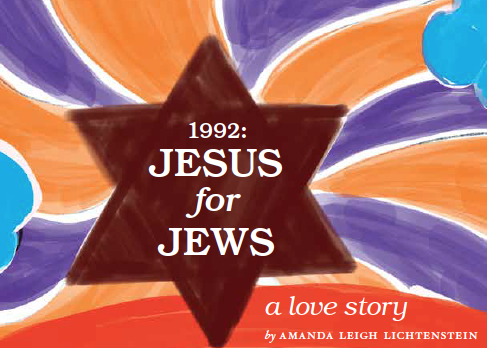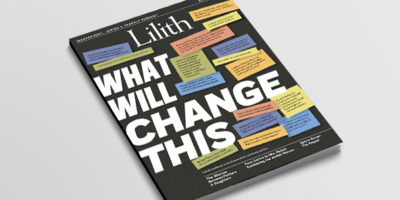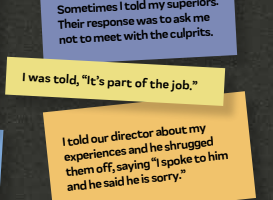
1992: Jesus for Jews
a love story
AI started bleeding when I was 13 years old—on the morning of my bat mitzvah. I was feeling especially chosen. I was a woman now. My older sister Nina taught me how to insert a tampon, and off I went to get my hair braided at a salon in a strip mall before heading to the synagogue. It was January 1988. Skokie, Illinois. The world was flat and gray and speckled with invisible sorrows. I wore a wool floral print dress suit, and just minutes before reading from the Torah, I ripped out that awful braid and wore my hair loose and wild at the altar of God.
There was nothing my horrified parents could do. They were fighting, back then. I’d seen my father screech to a halt, get out of the white Nissan, slam the car door, and go chasing after one of my mom’s lovers trespassing in our ’hood. Our home was a hoarding home, a tense and loving mess of pretense without context. At the end of my Torah portion, Rabbi Berkson turned to me, laid his hands on my shoulders, leaned in and whispered, “I know you’re angry. Try to forgive us. No one is perfect.” I probably sneered or shrugged; I was in a mood.
The following day, my parents threw a big family party for me. Snowflakes dropped steadily as all my relatives came to smear their messy kisses on both my cheeks, examine my changing body, and shove envelopes stuffed with 18 dollars inside—18 represents “chai,” life. I collected these envelopes with the growing dread that each represented a thank-you card I’d never write. All I wanted to do was go upstairs, lock myself in my bedroom, and cry. I was obliged to smile, kvell, and eat.
My parents hired a videographer to film the party. It was a thing back then. Everyone could leave me a personal video message. Uncle Blackie with his black toupée telling me I was the most wonderful kid in the world. Uncle Ray and Aunt Elaine congratulating me for such a beautiful reading. Mom in the kitchen carefully placing her mandel bread in pastel pastry cups. Dad with his banjo button-down shirt. Aunt Edna in her fabulous studded jumpsuit and bling earrings calling me over to her corner of the sofa for a private pep talk. Oy.
And then Cousin Terry, with her long lashes and freshly brushed, feathery hair, long purple pants and pink top to match, came into view in the video camera. She looked into the camera with her wide, trusting eyes and spoke directly to me with a sincere, high-pitched voice. “Mandy,” she said, “I am so proud of you. And Jesus loves you. He really, really does, Mandy. Jesus loves you so, so much and he’s so proud of you.” I rewound the video a couple of times just to make sure I was hearing her right.
Jesus? I was confused. I asked my mother why Terry had mentioned Jesus in my bat mitzvah video. My mother rolled her eyes and replied simply, Oh, never mind. Cousin Terry is a Jew for Jesus.
A Jew for Jesus? What’s that! I pestered my dad, who told me Jews for Jesus believe Jesus died for our sins and is actually the Messiah. But that the basic consensus was that Jesus was a beautiful man, but he’s not God, and we don’t believe that Jesus died for us, and we don’t believe he ever rose again. End of story.
Or so I thought.
And then Jesus walked back into my life again. When I was 15, I was cast as a reverend in Cotton Patch Gospel—a high school musical about, yes, Jesus! Our school’s theater director had decided to stage this “leg-slappin’, toe-tappin’, hand-clappin’ hoe-down of a story that retells the Gospels of Matthew and John—translated into present day Southern vernacular” with an amazing musical score by Harry Chapin. There we were, in suburban Skokie, attending Niles North High School, with its significant Jewish population, auditioning for this Jesus play!
Skokie. Where Holocaust survivors migrated in the 1950s and shuffled down grocery aisles with tattooed numbers on their arms. Skokie, where the KKK threatened to hold a rally downtown in 1977, when I was two. Skokie, home to many a dark, dimly lit synagogue full of sorrow and tsuris. Skokie, with its living room cabinets full of menorahs, matzoh, memories and Manischewitz. Skokie—guilt and gefilte-fish anthems.
Nearly the entire cast of our 1992 rendition of Cotton Patch Gospel was Jewish, and I am telling you—we killed it! I don’t remember a more jubilant and joyful theater production, one with more chutzpah or love for one another as cast members. We’d meet nearly every day after school for rehearsals that carried on through snowy Skokie nights, and, as if we were praying or davening, we mumbled verse after verse, lyric after lyric in the halls and mirrors of our high school theater, until those Gospels touched us to our fiery core.
We were so wildly committed that our show was selected for the Illinois State Theater Festival at the University of Illinois in Urbana-Champaign. In the middle of winter, when our entire state was covered in sheets of brutal ice, this cast of Jews got on a bus and headed down south. We performed to rave reviews in a huge auditorium for an audience of over 1,000 theater kids from all over the state.
I vividly remember my role as the reverend. In Jesus’s name, I prayed. I wore a shiny blue robe and raised my arms up high in the air, praise! The stage lights shone down on my eyes, blinding me from the black ocean of faces out in the audience. It was me and this light, my lines, these songs, this cast, this love—for acting, for a chance to get out of Skokie for the weekend, for liberation from my daily obsessions with zits and boys, for a moment of revelry and exaltation.
I was a believer.
That weekend, I learned how to play the “mirror” game for the first time in a massive acting workshop led by a young college student who at the time seemed like a wise old sage wearing a black turtleneck and a beret. Literally. We were paired with strangers our own age and had to face them—mirror their body movements without ever touching, making eye contact while tracing their bodies in space. We yearned to connect, desired freedom from our bodies, had obsessive crushes on James Taylor and Cat Stevens. We were already plotting how to get our “miracle” at next summer’s Grateful Dead show in Soldier’s Field.
Looking back, I see this was an introduction to our own version of liberation theology. We were Jews for Jesus in our own way, singing the Gospels, and even the two Israelis in our cast, beautiful sabras who could have been models, had no problem humming these Jesus lullabies as we blasted through the rural dark on a bus back to suburban Skokie late on Sunday night.
Now that we shone a little brighter with Jesus’s light, my three Jewish best friends at the time and I became obsessed with yet another musical about Jesus—Jesus Christ Superstar—the badass rock opera by Andrew Lloyd Weber and Tim Rice. After Cotton Patch Gospel, we felt part of a knowing tribe of people who got down with Jesus musicals. Jesus was a hot Jew and he loved us. Listening over and over again to this record album we clutched passionately on Jess’s bedroom floor would redeem us.
I highly recommend listening to Jesus Christ Superstar in one sitting. Do nothing—it will come for you.
This album drilled a dark hole straight to the gut of urgency and tenderness within us. Jesus’s story was a parable on belonging—every teenager could relate. My young heart stirred when I listened to Mary Magdalene soothing Jesus with her sweet song “Everything’s Alright.” Jesus starts to freak out about his doubtful followers who are badgering him. Mary—depicted as Jesus’s sultry lover—relaxes him with oils and sings him this most tender song.
Try not to get worried / Try not to turn onto / Problems that upset you Don’t you know/ Everything’s alright, yea / Everything’s fine And we want you to sleep well tonight. / Let the world spin without you tonight. Close your eyes, Close your eyes / And forget all about us tonight.
The song toggles between Mary and Jesus, with Jesus answering Mary that all will be sorry when he’s gone. Jesus is really having a low moment, and Mary’s honey voice and warm hands provided my first glimpse into the intimacies of pillow talk. Jesus exists in this song somewhere between God and man. Mary’s seductive presence is simply an expression of exalted love and heat generated by the tension of the political hour.
What more could a hormonal teenager want out of a Jesus musical? I listened to this song over and over again, a phantasm of religious fantasy in a threesome between me, Mary and Jesus. I could be a lover singing this with them. I could love myself loving love.
On Friday nights, we’d lie down on the carpet in Jess’s bedroom in the split-level house, so lovingly and safely provided by her parents. Downstairs, framed photos of her grandparents stood upright on the piano in the darkened living room. This was our Sabbath, void of challah, red wine or fire—we had each other and our longing. Up there in Jess’s room, we lived in a world of our own, wailing within us for a love that would beg the question, “What’s it all about?”
Embroiled in our own impending love trials, tribulations, betrayals, late-night experiments, dazed afternoons in the waterbeds of boys who loved their fish tanks more than us, we understood this album on a deep level.
We, too, felt our own hearts flying in opposite directions of our best selves, sneaking behind each other’s backs for affection from the same stoner with greasy hair who, in turn, really didn’t deserve any of our love. We, too, tried not to get worried or turned onto things that upset us when we’d see that same stoner breathing heavy into the ears of new girls with new piercings in other spheres and frontiers not yet imagined by us. We, too, wanted this stoner to sleep with us and soothe us and anoint us, but everything was not alright, no, everything was not just fine.
Our nascent, messy love lives were about to implode, and with each spin of the Jesus Christ Superstar record, we were taking notes. As Judas points an accusing finger at Mary, calling her a prostitute, and Jesus defends her, blaming Judas and his followers for being “shallow and thick,” we, too, began pointing fingers at each other, accusing ourselves and each other of massive, irrevocable betrayals.
A Jesus play in Skokie, home to many a dark, dimly lit synagogue full of sorrow and tsuris.
Merel lost her virginity to the stoner, and then so did Jess, on different nights, in variant seasons of the Hebrew and Latin calendars. I knew Jess’s secret, and I kept it. But Merel found out eventually, and she no longer knew how to love us, and was asking herself, what the fuck is this all about, and we could not answer her. Surely, we were not saying we had the resources to save Merel from her love lot, but we thought we could save our friendship and we tried.
We struggled, pathetically. We were lost, and we were sorry when Merel was gone. When do we arrive in Jerusalem? When do we arrive in Jerusalem? We shouted to the Skokie night sky.
We chanted these feverish lyrics like a prayer soaked in patchouli until I finally did make it to Israel on one of those Zionist programs designed to encourage young Jewish Americans to make aliyah—to ascend and stake a claim in the Promised Land. What can I say? It was all-expenses paid, and my older sister had already paved the way, having been there the year before on the same program.
I arrived in Jerusalem when I was 17 and in the haze of hormones, heat and heretical bliss. I was stuffing my face with french-fry-filled falafel sandwiches on Ben Yehuda Street, crushing on Adam, the German street painter with green eyes and golden curls, debating with Jade, the first woman I ever met with a gentle beard and chest hair, and stood wailing at the Wailing Wall of the Second Temple, freaky-dancing with tall Jordanians and Brits at the Underground.
That semester, I visited the Church of the Holy Sepulchre, where Jesus himself was said to have been crucified and resurrected. There I was, totally unaware of its significance. But when I returned to Skokie that summer, I fell in love with a lanky bearded boy down the block who resembled Jesus, and for a while, I believed he was willing to die for my sins. I loved him like a delirious disciple.
Many other men have since walked into and out of my life, but never on water and never to anoint. I don’t think of Jesus often now, but he was my first real love.
Amanda Leigh Lichtenstein is a poet and writer from Chicago. Her essays and poems appear in Hypertext, Another Chicago Magazine, Fortunate Traveller, and Punch Drunk Press, among others. Follow her on Twitter @travelfarnow.



